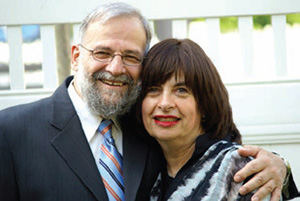
It’s not easy to acknowledge a fault. Every married couple knows that turning to a partner and asking forgiveness upon realizing that one has made a mistake takes a good deal of effort and strength. Sometimes it is easier to write one’s feelings in the form of a note; others might do it by sending flowers, but we do believe that the most effective way of asking forgiveness is by doing it face to face. It definitely can hurt and takes much more courage, but looking each other in the eye and agreeing that a mistake was made is heart-wrenching in its simplicity and beauty, and can do nothing but bring a couple closer.
In the case of young children, it is important from an early age to tell them that we are sorry if we realize we misjudged them or yelled at them unnecessarily. It is not necessary to dwell on it; once is more than enough to mention it.
As our children get older we must take responsibility for our faults. Often, we criticize them for behaviors they are mimicking from home. From their responses we can easily see how much we have hurt them. We need to transfer to them the obligation to ask for forgiveness upon doing a misdeed. They will learn to respect you for it.
It is painful to hear how many families are broken due to behaviors that in ordinary circumstances would be considered quite trivial. Is it really necessary not to speak to a sibling because he was not able to attend a simcha in the family? What about the siblings who believe that they are more entitled to their late parents’ household items? Is it worth it to break up a family over a piece of china, a silver Kiddush cup or a 50-year-old antique chair? We have seen it time and time again. There is always the brother-in-law who thinks he knows everything better than everyone else. There is the aunt who cannot tolerate the noise that her nieces and nephews make. Everyone, give it up. Life is too short. We have met so many lonely people who have family living within their same cities whom they refuse to contact because of some minute, ridiculous action that in some cases happened 20 years before.
In the tefillah zaka, the Chayei Adam brings to our attention that there are two kinds of transgressions. The first is between man and Hashem. The second is between man and his fellow man. He explains that our relationship between man and Hashem affords us forgiveness through our tefillot, but those between man and man cannot be forgiven unless we personally address our remorse to the person we have hurt. Asking for forgiveness only is allowed when one is totally sincere. Making excuses and rationalizing our behaviors does not in any way forgive the hurt we have caused someone. We all know this is not an easy task. We all easily justify why we did what we did. When asking forgiveness we need to realize that it is irrelevant of what our thoughts were. Our goal is to sincerely wipe the slate clean. These actions are very difficult, yet once done allow us the opportunity to begin the new year with a confidence that we are sincerely trying to be better and more honest individuals.
We would like to ask any of you whom we have offended by any of our articles throughout the year to please forgive us. Never was there an intention to do so. As well, we are very grateful to all of you who have been in touch through this column. As a very last thought, we want to wish Moshe, our son-in-law, a most sincere mazel tov on this 200th issue of The Jewish Link. His dream has become a Shabbat staple in the homes of the Bergen, Essex, Middlesex, Passaic, & Union county observant communities. We are proud of what he has accomplished and send him much love.
By Rabbi Mordechai and Nina Glick
Rabbi Mordechai and Nina Glick are living in Bergenfield after many years of service to the Montreal Jewish community. Rabbi Glick was the rav of Congregation Ahavat Yisroel as well as a practicing clinical psychologist in private practice. He also taught at Champlain Regional College. The Glicks were frequent speakers at the OU marriage retreats. Nina coordinated all Yachad activities in Montreal and was a co/founder of Maison Shalom, a group home for young adults with special needs. They can be reached at [email protected].








